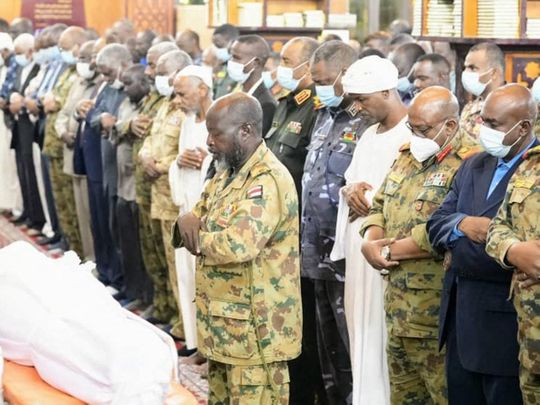
Khartoum: Sudanese protesters stabbed to death a police general on Thursday, authorities said, and a protester was killed during the latest in weeks of rallies opposed to an October military take over.
Brigadier General Ali Bareema Hamad “fell martyr while doing his duties and securing protests” in the capital Khartoum, a police statement said on Facebook.
Hamad “received deadly stabs by groups of protesters... in different parts of his body,” police spokesman Idris Abdulla Idris told Sudan TV.
Other police personnel “suffered severe wounds,” he added.
Hamad’s was the first fatality announced among security forces since protests calling for a return to civilian rule began more than two months ago.
During that time at least 64 other people have been killed and hundreds wounded in a security crackdown, according to medics, who said live rounds killed many of the protesters.
The latest protester death also came on Thursday. Security forces shot Al Reeh Mohammad in the stomach in the Khartoum area, the pro-democracy Central Committee of Sudan Doctors said on Facebook.
Thousands of demonstrators took to the streets after a United Nations bid to facilitate talks between Sudanese groups received tepid support.
The UN push aims to help resolve the crisis since the October 25 military coup led by General Abdul Fattah Al Burhan.
Sudan has no government, foreign aid has been suspended, and regular demonstrations against the military takeover - attended by up to tens of thousands - are routinely met by a violent response from authorities.
Demonstrators also took to the streets in the capital’s twin city of Omdurman as well as in Port Sudan in the country’s east, according to witnesses.
Protesters in Khartoum converged on the city centre chanting: “With all our power, we are heading to the palace”.
Following a repeated pattern, security forces fired volleys of tear gas to disperse the protesters in Khartoum and Omdurman, witnesses said.
Online footage appeared to show demonstrators hurling stones and unexploded canisters of tear gas at security forces near the presidential palace.
The military takeover derailed a fragile transition to civilian rule following Omar Al Bashir’s ouster.
Authorities have repeatedly denied using live ammunition in confronting protesters and insist scores of security personnel have been wounded during demonstrations that have often “deviated from peacefulness”.
‘Not clear’
On Monday, UN special representative Volker Perthes said he was launching “consultations” with political and social actors as well as armed and civil society groups.
The UN push has received a mixed response.
“We don’t accept this initiative at all,” 62-year-old protester Awad Saleh said.
“It’s not clear what points it constitutes and so for us it is deficient.”
The Sudanese Professionals Association, an independent trade union confederation instrumental in organising the protests, said it completely rejects the UN initiative.
The mainstream faction of the Forces for Freedom and Change, the leading civilian pro-democracy group, said it will “discuss” the invitation internally before announcing its stand.
But spokesman Wagdy Saleh said the FFC rejected “any partnership” with the military.
On Wednesday, Egyptian President Abdul Fattah Al Sissi called for stability in Sudan saying it “will not be reached except by consensus among all forces”.
Al Burhan has insisted that the military takeover “was not a coup” but only meant to “rectify the course of the Sudanese transition.
Abdulla Hamdok resigned as civilian prime minister on January 2.
In his resignation speech, Hamdok warned that Sudan was now at a “dangerous crossroads threatening its very survival”.












